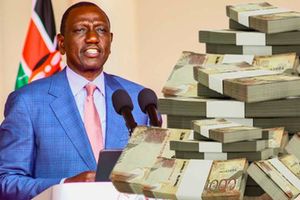
A man holds his smartphone with the display of different types of mobile loan lending services displayed on his screen, in this illustration photo taken in Nairobi, December 8, 2021.
The government’s revenue-raising plan for the next 12 months starting July — the Finance Bill 2025 — is said to have struck a conciliatory tone, avoiding the punitive tax measures like those in the aborted Finance Bill, 2024, which triggered nationwide protests that left scores of youth dead.
Yet, hidden beneath this veneer of a moderate Finance Bill are painful changes that might hurt Wanjiku, including farmers, patients, borrowers of digital loans or first-time owners of affordable homes, various experts have told the Nation.
Even worse is another attempt by the National Treasury to circumvent the constitutional requirement for the government to seek court orders before accessing sensitive information from taxpayers.
The most notable amendment in the Finance Bill, 2025, is the shake-up of the Value Added Tax (VAT) Act, by moving some of the goods on the zero-rating schedule to the exempt status, with the Parliamentary Budget Office, a think-tank for legislators, wondering whether this amounts to “cleaning up or cashing in.”
VAT, applied at the standard rate of 16 per cent, is levied on goods and services that Kenyans consume every day.
However, inputs or raw materials used to manufacture medical products and animal feeds; transportation of sugar from farms to milling factories; locally assembled and manufactured mobile phones; electric bicycles; and solar and lithium-ion batteries are zero-rated.
Also under VAT, packing materials for tea and coffee have moved from the zero-rating status to exempt, which means that the cost of produce in the global market will go up, thus making them uncompetitive.
This means that while businesses do not charge consumers the 16 percent VAT, they calculate and pay to the Kenya Revenue Authority (KRA), but are allowed to later claim a refund of this expense, known as input VAT, from the taxman.

Times Tower in Nairobi, the headquarters of the Kenya Revenue Authority (KRA).
However, since these items have been moved from the zero-rating schedule of VAT to the exempt status, it means these supplies are not taxable, and therefore input VAT cannot be claimed from the KRA.
It is a development that is likely to increase the cost of essential goods and services, including food and healthcare, whose increase tends to hit the poor hardest.
President William Ruto’s administration wants to reduce the so-called tax expenditures, or the money the government gives up by not collecting certain taxes, with VAT refunds to manufacturers of zero-rated items constituting the biggest chunk of these expenditures.
Tax expenditures
“Non-resolution of questions related to tax expenditures still provide for revenue leakages, while new VAT measures are expected to push consumer prices upwards, thereby raising the cost of living and disproportionately affecting low-income households,” said Mr Leonard Wanyama, Regional Coordinator for the East African Tax and Governance Network.
President Ruto’s government reckons that there has been an abuse of the VAT refund process, with some businesses not passing on the benefit to consumers.
In 2023, tax expenditure rose by Sh117.47 billion to Sh510.56 billion, with a big chunk being refunds on zero-rated supplies, a report by the Treasury shows.
Still on VAT refunds, which rose by 11.8 per cent to Sh134.16 billion in 2023, the government wants to extend the period that KRA should refund businesses to 120 days from the current 90 days.
This will affect the “liquidity and financial operations” of small businesses, making it difficult for them to make new orders or even expand their businesses, said Mr Wanyama.
Normally, goods and services on an official aid-funded project, a project financed through a grant or concessional loan under an agreement between the Kenyan government and a foreign government, agency, or aid organisation, are exempt from VAT.
However, in the changes proposed in the Bill, lubricants and fuels will attract the standard 16 per cent VAT, pushing up the cost of aid-funded projects.
And in what could be interpreted as a case of shooting itself in the foot, the Kenya Kwanza administration has proposed to apply 16 percent VAT on construction materials for affordable housing projects, a move that is likely to increase the cost of low-cost homes. The affordable housing programme is a pet project of President William Ruto.
The government has also set its sights on the expansive digital lending space, especially when provided by foreigners, with the Bill proposing to expand the scope of excise duty charged on digital platforms to include services offered by non-resident persons over the internet, an electronic network, or through a digital marketplace.
Additionally, the Bill introduces the definition of non-resident person to mean a person who is outside Kenya.
The amendment, reckons Dr Lyla Latif, the Chief Executive at Lai’Latif & Co Advocates, will increase the rates that digital lenders must charge Kenyans to access credit.
“This will financially exclude many in the lower and middle-class brackets who will have lower access to short-term credit and rely on digital loans for business capital, school fees, rent payments, and emergency expenses,” said Dr Latif.

A man holds his smartphone with the display of different types of mobile loan lending services displayed on his screen, in this illustration photo taken in Nairobi, December 8, 2021.
In 2024, around 668,491 Kenyans said they got digital loans through the apps they downloaded on their phones, an increase from 583,263 in 2021, a joint study on financial inclusion by the Central Bank of Kenya and the Kenya National Bureau of Statistics shows, pointing to the increased usage of digital loans.
However, there are those who say the expansion is aimed at addressing the current imbalance by extending excise duty to foreign companies offering digital services in Kenya.
“This creates a more level playing field for Kenyan providers who were previously disadvantaged,” said audit firm Grant Thornton in a note on the Finance Bill 2024.
Fresh attempt
The National Treasury has also made a fresh attempt to access personal data details without a court warrant, as part of a wider objective of expanding the tax base by monitoring transactions of businesses by linking with their systems.
It proposes to amend the Tax Procedures Act, 2024, by deleting the provision that prohibits the KRA from accessing sensitive information when integrating with businesses to give it real-time transactional data.
This has made a lot of Kenyans jittery over the potential of a privacy breach by the KRA, as it looks for unfettered access to financial data, explains Mr Wanyama, whose organisation is a member of the civil society Okoa Uchumi Coalition.
Currently, the law allows the KRA to integrate its systems with those of businesses, but excludes ‘trade secrets’ and ‘private personal information’ from the items that can be accessed by the taxman.
Treasury Cabinet Secretary John Mbadi insists the law has not defined the two terms, and without the definition, the KRA would be unable to access any relevant information, undermining tax enforcement.
“This amendment was mischievous in my view - it was denying KRA the opportunity to see people who are avoiding paying,” said Mr Mbadi in an earlier interview on one of the local TV stations.
However, Section 60 of the Tax Procedures Act requires the taxman to first obtain a court order before going after private information, a route that the government reckons is long given they need real-time visibility.
Section 51 (2) of the Data Protection Act 2019 allows for exemption of controllers and data processors from sharing personal data with a third party if it relates to the individual himself purely for personal or household activity and when it is necessary for national security or public interest.
Section 51 (2)(c) also allows for exemption if the disclosure is required by or under any written law or by an order of the court, a clause that the government wanted the KRA excluded from in the Finance Bill 2024 that was rejected.









